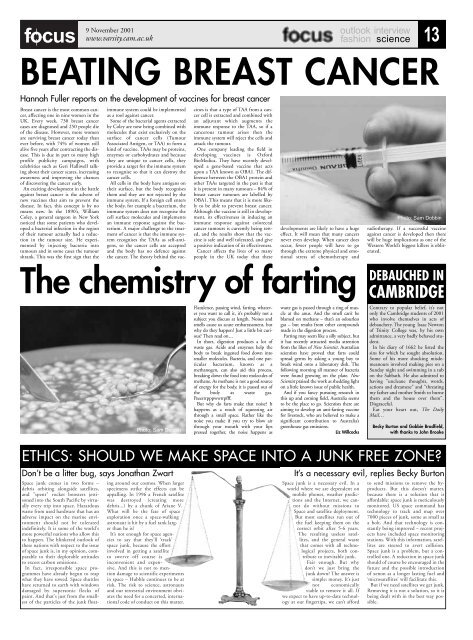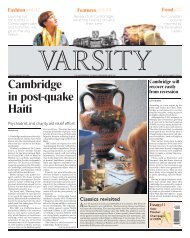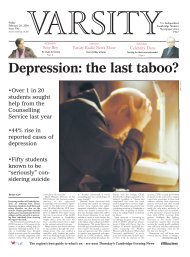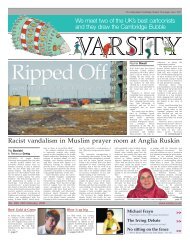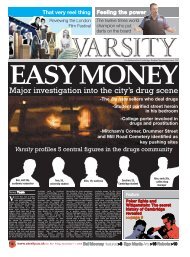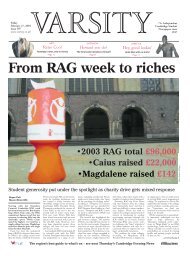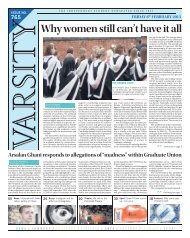John's students urinate on staircase and Corpus' sexual ... - Varsity
John's students urinate on staircase and Corpus' sexual ... - Varsity
John's students urinate on staircase and Corpus' sexual ... - Varsity
You also want an ePaper? Increase the reach of your titles
YUMPU automatically turns print PDFs into web optimized ePapers that Google loves.
focus<br />
Breast cancer is the most comm<strong>on</strong> cancer,<br />
affecting <strong>on</strong>e in nine women in the<br />
UK. Every week, 730 breast cancer<br />
cases are diagnosed <strong>and</strong> 250 people die<br />
of the disease. However, more women<br />
are surviving breast cancer today than<br />
ever before, with 74% of women still<br />
alive five years after c<strong>on</strong>tracting the disease.<br />
This is due in part to many high<br />
profile publicity campaigns, with<br />
celebrities such as Geri Halliwell talking<br />
about their cancer scares, increasing<br />
awareness <strong>and</strong> improving the chances<br />
of discovering the cancer early.<br />
An exciting development in the battle<br />
against breast cancer is the advent of<br />
new vaccines that aim to prevent the<br />
disease. In fact, this c<strong>on</strong>cept is by no<br />
means new. In the 1890’s, William<br />
Coley, a general surge<strong>on</strong> in New York<br />
noticed that some patients who developed<br />
a bacterial infecti<strong>on</strong> in the regi<strong>on</strong><br />
of their tumour actually had a reducti<strong>on</strong><br />
in the tumour size. He experimented<br />
by injecting bacteria into<br />
tumours <strong>and</strong> in some cases the tumour<br />
shrank. This was the first sign that the<br />
Space junk comes in two forms –<br />
debris orbiting al<strong>on</strong>gside satellites,<br />
<strong>and</strong> "spent" rocket boosters jettis<strong>on</strong>ed<br />
into the South Pacific by virtually<br />
every trip into space. Hazardous<br />
waste from used hardware that has an<br />
adverse impact <strong>on</strong> the marine envir<strong>on</strong>ment<br />
should not be tolerated<br />
indefinitely. It is some of the world's<br />
more powerful nati<strong>on</strong>s who allow this<br />
to happen. The blinkered outlook of<br />
these nati<strong>on</strong>s with respect to the issue<br />
of space junk is, in my opini<strong>on</strong>, comparable<br />
to their deplorable attitudes<br />
to excess carb<strong>on</strong> emissi<strong>on</strong>s.<br />
In fact, irresp<strong>on</strong>sible space programmes<br />
have already begun to reap<br />
what they have sowed. Space shuttles<br />
have returned to earth with windows<br />
damaged by supers<strong>on</strong>ic flecks of<br />
paint. And that's just from the smallest<br />
of the particles of the junk float-<br />
9 November 2001<br />
www.varsity.cam.ac.uk<br />
immune system could be implemented<br />
as a tool against cancer.<br />
Some of the bacterial agents extracted<br />
by Coley are now being combined with<br />
molecules that exist exclusively <strong>on</strong> the<br />
surface of cancer cells (Tumour<br />
Associated Antigen, or TAA) to form a<br />
kind of vaccine. TAAs may be proteins,<br />
enzymes or carbohydrates <strong>and</strong> because<br />
they are unique to cancer cells, they<br />
provide a target for the immune system<br />
to recognise so that it can destroy the<br />
cancer cells.<br />
All cells in the body have antigens <strong>on</strong><br />
their surface, but the body recognises<br />
them <strong>and</strong> they are not rejected by the<br />
immune system. If a foreign cell enters<br />
the body, for example a bacterium, the<br />
immune system does not recognise the<br />
cell surface molecules <strong>and</strong> implements<br />
an immune resp<strong>on</strong>se against the bacterium.<br />
A major challenge to the treatment<br />
of cancer is that the immune system<br />
recognises the TAAs as self-antigens,<br />
so the cancer cells are accepted<br />
<strong>and</strong> the body has no defence against<br />
the cancer. The theory behind the vac-<br />
ing around our cosmos. When larger<br />
specimens strike the effects can be<br />
appalling. In 1996 a French satellite<br />
was destroyed (creating more<br />
debris...) by a chunk of Ariane V.<br />
What will be the fate of space<br />
explorati<strong>on</strong> <strong>on</strong>ce a space-walking<br />
astr<strong>on</strong>aut is hit by a fuel tank larger<br />
than he is?<br />
It’s not enough for space agencies<br />
to say that they’ll ‘track’<br />
space junk, because the effort<br />
involved in getting a satellite<br />
to swerve off course is<br />
inc<strong>on</strong>venient <strong>and</strong> expensive.<br />
And this is not to menti<strong>on</strong><br />
damage to scientific experiments<br />
in space – Hubble c<strong>on</strong>tinues to be at<br />
risk. The risk to science, astr<strong>on</strong>auts<br />
<strong>and</strong> our terrestrial envir<strong>on</strong>ment obviates<br />
the need for a c<strong>on</strong>certed, internati<strong>on</strong>al<br />
code of c<strong>on</strong>duct <strong>on</strong> this matter.<br />
cines is that a type of TAA from a cancer<br />
cell is extracted <strong>and</strong> combined with<br />
an adjuvant which augments the<br />
immune resp<strong>on</strong>se to the TAA, so if a<br />
cancerous tumour arises then the<br />
immune system will reject the cells <strong>and</strong><br />
attack the tumour.<br />
One company leading the field in<br />
developing vaccines is Oxford<br />
BioMedica. They have recently developed<br />
a gene-based vaccine that acts<br />
up<strong>on</strong> a TAA known as OBA1. The difference<br />
between the OBA1 protein <strong>and</strong><br />
other TAAs targeted in the past is that<br />
it is present in many tumours – 84% of<br />
breast cancer tumours are labelled by<br />
OBA1. This means that it is more likely<br />
to be able to prevent breast cancer.<br />
Although the vaccine is still in development,<br />
its effectiveness in inducing an<br />
immune resp<strong>on</strong>se against colorectal<br />
cancer tumours is currently being tested,<br />
<strong>and</strong> the results show that the vaccine<br />
is safe <strong>and</strong> well tolerated, <strong>and</strong> give<br />
a positive indicati<strong>on</strong> of its effectiveness.<br />
Cancer affects the lives of so many<br />
people in the UK today that these<br />
developments are likely to have a huge<br />
effect. It will mean that many cancers<br />
never even develop. When cancer does<br />
occur, fewer people will have to go<br />
through the extreme physical <strong>and</strong> emoti<strong>on</strong>al<br />
stress of chemotherapy <strong>and</strong><br />
Space junk is a necessary evil. In a<br />
world where we are dependent <strong>on</strong><br />
mobile ph<strong>on</strong>es, weather predicti<strong>on</strong>s<br />
<strong>and</strong> the Internet, we cannot<br />
do without missi<strong>on</strong>s to<br />
Space <strong>and</strong> satellite deployment.<br />
But most satellites run out of<br />
the fuel keeping them <strong>on</strong> the<br />
correct orbit after 5-6 years.<br />
The resulting useless satellites,<br />
<strong>and</strong> the general waste<br />
that comes with all technological<br />
projects, both c<strong>on</strong>tribute<br />
to inevitable junk.<br />
Fair enough. But why<br />
d<strong>on</strong>’t we just bring the<br />
junk down? The answer is<br />
simple: m<strong>on</strong>ey. It’s just<br />
not ec<strong>on</strong>omically<br />
viable to remove it all. If<br />
we expect to have up-to-date technology<br />
at our fingertips, we can’t afford<br />
outlook interview<br />
fashi<strong>on</strong> science<br />
BEATING BREAST CANCER<br />
Hannah Fuller reports <strong>on</strong> the development of vaccines for breast cancer<br />
The chemistry of farting<br />
Photo: Sam Dobbin<br />
Flatulence, passing wind, farting, whatever<br />
you want to call it, it’s probably not a<br />
subject you discuss at length. Noises <strong>and</strong><br />
smells cause us acute embarrassment, but<br />
why do they happen? Just a little bit curious?<br />
Then read <strong>on</strong>…<br />
In short, digesti<strong>on</strong> produces a lot of<br />
waste gas. Acids <strong>and</strong> enzymes help the<br />
body to break ingested food down into<br />
smaller molecules. Bacteria, <strong>and</strong> <strong>on</strong>e particular<br />
bacterium, known as a<br />
methanogen, can also aid this process,<br />
breaking down the food into molecules of<br />
methane. As methane is not a good source<br />
of energy for the body, it is passed out of<br />
the body as waste gas.<br />
Peeerrrpppwwrrpfff.<br />
But why do farts make that noise? It<br />
happens as a result of squeezing air<br />
through a small space. Rather like the<br />
noise you make if you try to blow air<br />
through your mouth with your lips<br />
pressed together, the noise happens as<br />
waste gas is passed through a ring of muscle<br />
at the anus. And the smell can’t be<br />
blamed <strong>on</strong> methane – that’s an odourless<br />
gas – but results from other compounds<br />
made in the digesti<strong>on</strong> process.<br />
Farting may seem like a silly subject, but<br />
it has recently attracted media attenti<strong>on</strong><br />
from the likes of New Scientist. Australian<br />
scientists have proved that farts could<br />
spread germs by asking a young boy to<br />
break wind <strong>on</strong>to a laboratory dish. The<br />
following morning all manner of bacteria<br />
were found growing <strong>on</strong> the plate. New<br />
Scientist praised the work as shedding light<br />
<strong>on</strong> a little known issue of public health.<br />
And if you fancy pursuing research in<br />
this up <strong>and</strong> coming field, Australia seems<br />
to be the place to go. Scientists there are<br />
aiming to develop an anti-farting vaccine<br />
for livestock, who are believed to make a<br />
significant c<strong>on</strong>tributi<strong>on</strong> to Australia’s<br />
greenhouse gas emissi<strong>on</strong>s.<br />
Liz Willcocks<br />
13<br />
Photo: Sam Dobbin<br />
radiotherapy. If a successful vaccine<br />
against cancer is developed then there<br />
will be huge implicati<strong>on</strong>s as <strong>on</strong>e of the<br />
Western World’s biggest killers is obliterated.<br />
DEBAUCHED IN<br />
CAMBRIDGE<br />
C<strong>on</strong>trary to popular belief, it’s not<br />
<strong>on</strong>ly the Cambridge <str<strong>on</strong>g>students</str<strong>on</strong>g> of 2001<br />
who involve themselves in acts of<br />
debauchery. The young Isaac Newt<strong>on</strong><br />
of Trinity College was, by his own<br />
admittance, a very badly behaved student.<br />
In his diary of 1662 he listed the<br />
sins for which he sought absoluti<strong>on</strong>.<br />
Some of his more shocking misdemeanours<br />
involved making pies <strong>on</strong> a<br />
Sunday night <strong>and</strong> swimming in a tub<br />
<strong>on</strong> the Sabbath. He also admitted to<br />
having "uncleane thoughts, words,<br />
acti<strong>on</strong>s <strong>and</strong> dreamese" <strong>and</strong> "threating<br />
my father <strong>and</strong> mother Smith to burne<br />
them <strong>and</strong> the house over them".<br />
Disgraceful.<br />
Eat your heart out, The Daily<br />
Mail…<br />
Becky Burt<strong>on</strong> <strong>and</strong> Gabbie Bradfield,<br />
with thanks to John Brooke<br />
ETHICS: SHOULD WE MAKE SPACE INTO A JUNK FREE ZONE?<br />
D<strong>on</strong>’t be a litter bug, says J<strong>on</strong>athan Zwart It’s a necessary evil, replies Becky Burt<strong>on</strong><br />
to send missi<strong>on</strong>s to remove the byproducts.<br />
But this doesn’t matter,<br />
because there is a soluti<strong>on</strong> that is<br />
affordable: space junk is meticulously<br />
m<strong>on</strong>itored. US space comm<strong>and</strong> has<br />
technology to track <strong>and</strong> map over<br />
7000 pieces of junk, some as small as<br />
a bolt. And that technology is c<strong>on</strong>stantly<br />
being improved – recent projects<br />
have included space m<strong>on</strong>itoring<br />
stati<strong>on</strong>s. With this informati<strong>on</strong>, satellites<br />
are steered to avert collisi<strong>on</strong>.<br />
Space junk is a problem, but a c<strong>on</strong>trolled<br />
<strong>on</strong>e. A reducti<strong>on</strong> in space junk<br />
should of course be encouraged in the<br />
future <strong>and</strong> the possible introducti<strong>on</strong><br />
of xen<strong>on</strong> as a l<strong>on</strong>ger lasting fuel <strong>and</strong><br />
‘microsatellites’ will facilitate this.<br />
But if we need satellites we get junk.<br />
Removing it is not a soluti<strong>on</strong>, so it is<br />
being dealt with in the best way possible.


